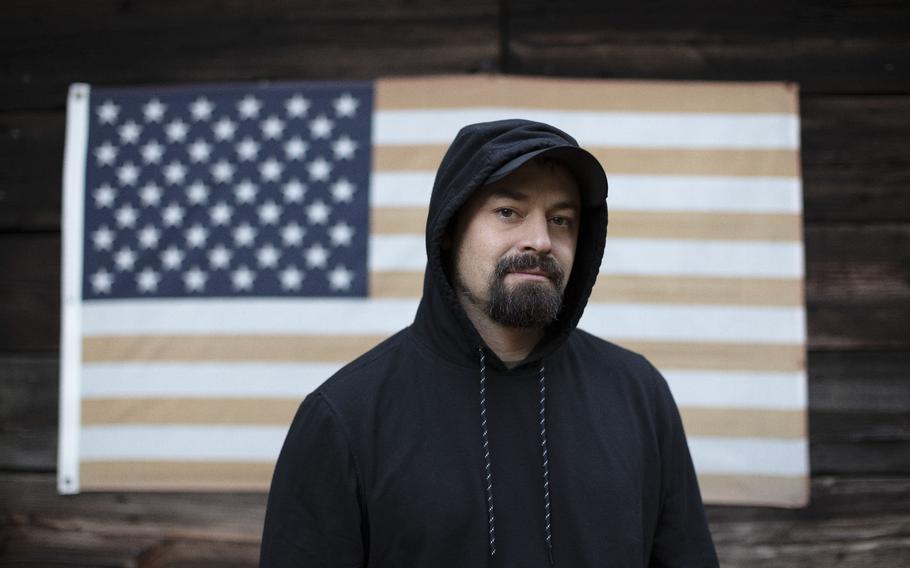
Korey Rowe stands at the start of an interstate ATV forest trail that runs past his house in Oneonta, N.Y., on October 20, 2021. (Nadia Sablin/For The Washington Post)
ONEONTA, N.Y. — Korey Rowe was always trying to salvage something good from something bad, and this time that took shape as a literal renovation: He wanted to transform the abandoned karate dojo on Main Street into a full-service video production studio, and perhaps transform himself into something else along the way, too.
But around late summer, as he mapped out his next steps, he began to receive emails and phone calls from journalists and podcasters. They had questions about the past, not the future.
The callers wanted to know about the conspiracy theories Korey helped spread in the mid-2000s while he was serving as an infantryman in the Army, the ones about the 9/11 terrorist attacks.
They wanted to know whether he believed, as some of them did, that the viral films he helped distribute as a 20-something had kicked off a cultural shift that culminated in the political rise of Donald Trump.
They wanted to know whether he felt at all responsible for the 9/11 Truth movement now embraced by right-wing political extremists, and for modern American conspiracy-theory culture itself.
Korey was a man in the business of telling stories, and this was the simple story he told about himself: He made a lot of bad decisions while growing up in rural upstate New York. He enlisted in the military just weeks before the terrorist attacks in 2001 to bring some order to his life. And then the accumulated trauma from serving in two wars that he never expected left him deeply broken.
The narrative grew more complicated from there, rising to a climax of fringe beliefs and OxyContin, of jail time and uncontrollable anger.
He had tried to put it behind him.
"I just want to be Korey Rowe from Oneonta," he said. "I'm a father and a business owner and a community member."
These days, Korey, 38, took comfort in the idea that he was the most average man in America. Average height, he said, average weight, average intelligence. And what was more American than the pursuit of a dream? Oneonta, his hometown, had once felt like a cage. Now, after several years of struggling to build a middle-class life in Los Angeles, he had returned home, where he saw so much potential for himself, his wife and their two young daughters.
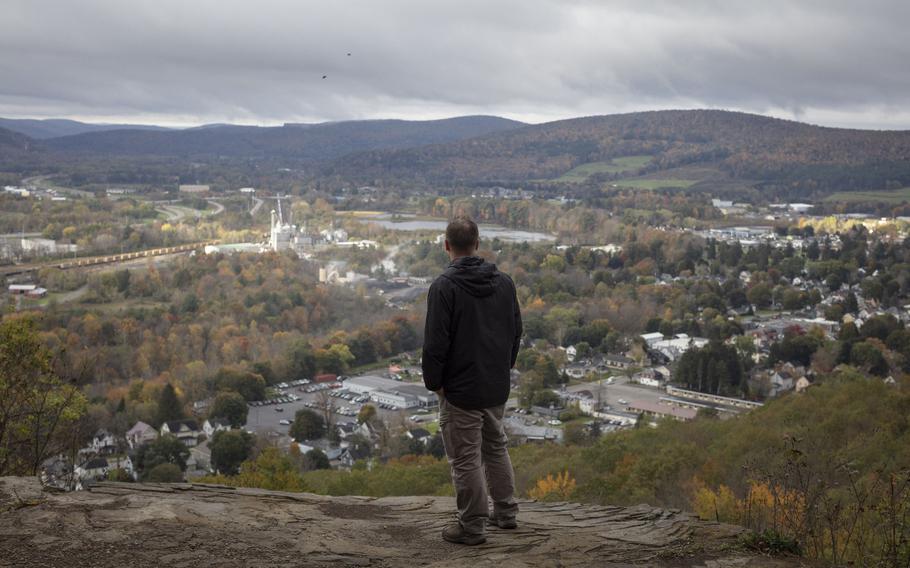
Korey Rowe stands at the overlook at the top of the trail he used to frequent as a young man in Oneonta, N.Y., on October 19, 2021. (Nadia Sablin/For The Washington Post)
The strategy would be straightforward. Local businesses needed to tell their stories to draw customers, and Korey had spent years learning to do precisely that. Making commercials would bring steady money, and shooting independent narrative film projects would bring creative fulfillment.
Korey looked at the uneven wood floors and the hornet infestation at the old dojo. Out of the disorder, he hoped to create the only media company of its kind here in the foothills of the Catskill Mountains. And he wanted to bring jobs to rural Otsego County, he said, for people like him who were interested in making videos but could find few outlets to do so.
A renovation, and maybe a reclamation.
Business would pick up soon, he believed, once the leaves began to turn and the autumn landscape brought a rush of video shoots.
But the calls from the past kept coming.
The emails were piling up.
— — —
Korey's dream of becoming a filmmaker began in the mid-aughts when, after serving in Afghanistan and Iraq, he helped his best friend, Dylan Avery, produce some of the first viral conspiracy-theory videos of the internet era. They had met when they were 14 while working newspaper delivery routes in Oneonta.
The series in question, "Loose Change," made fantastical claims about the Sept. 11, 2001, attacks, including that the World Trade Center was brought down by explosives rather than airplanes and that the Pentagon had been attacked by a military missile. Laced throughout the videos was the suggestion that the U.S. government was intentionally concealing the truth about the attacks, including perhaps its own participation in them. It melded compelling narration drawn from internet research with engrossing news footage from the attacks to create a highly watchable documentary.
Dylan, the project's architect and director, had stitched together the first edition of the film on a personal computer while Korey was in the Middle East. When Korey returned home from Iraq in 2004, he joined Dylan as a producer. He threw himself wholeheartedly into researching and, later, into helping to distribute successive cuts of the film, DVD by DVD.
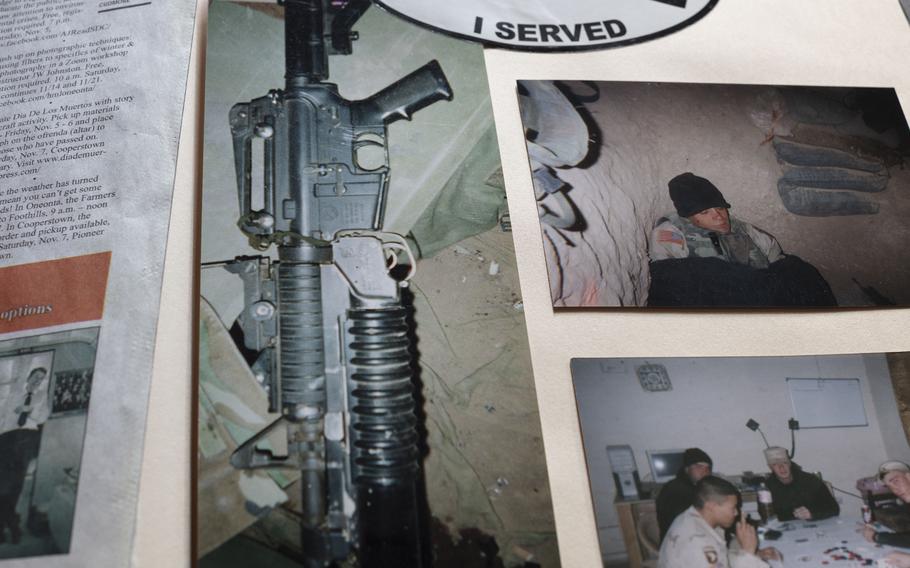
A scrapbook Korey Rowe has made of his time in the military and other significant professional and personal events in Oneonta, N.Y., on October 19, 2021. (Nadia Sablin/For The Washington Post)
"I was … angry. I was angry at the government. I was angry at the media. I just wanted to say something," Korey recalled. "And so this became my vessel. We never, ever, ever expected it to go anywhere."
What happened next with "Loose Change" was well documented. An 88-minute second edition of the series arrived in 2006 at precisely the right moment to capitalize on the way social media was rapidly changing how Americans connected with one another. Although widely debunked, the video exploded on Google Video, a predecessor to YouTube, and gained an almost cultlike following among anti-government skeptics, including several minor celebrities. The series became a central pillar of the fringe-yet-vocal 9/11 Truth movement that sprang up in fierce opposition to the George W. Bush administration.
Millions of people watched the various versions online. One 2006 profile in Vanity Fair said "Loose Change" "just might be the first internet blockbuster."
Dylan had first set out to write a fictional film about a group of friends who uncovered a 9/11 government conspiracy. They even filmed poorly acted scenes while Korey was home on leave from the military.
Then came a postmodern plot twist: While doing research, Dylan and Korey began to believe the conspiracy theories. Dylan dropped the narrative elements and made a documentary instead.
"I had seen countless innocent people die for no good reason, for a war that was based on lies," Korey said. "This wasn't a report I read. I was there. I saw them rob the American taxpayers and murder innocent people by invoking 9/11 every day."
Although they did not know it back then, Korey and Dylan were at the forefront of an unsettling shift that would soon upend American life in ways big and small. Citizen journalists and amateur storytellers, empowered like never before by technological and social shifts, had become soldiers in a guerrilla war over facts and fantasy.
The reporters and podcasters started to call Korey ahead of the 20th anniversary of 9/11.
Amid an ongoing global pandemic that many people had come to deny, and a baseless national dispute over the results of the 2020 election, they were trying to understand how reality had become a partisan prize to be won.
Some of them told Korey they believed "Loose Change" had been a blueprint of viral conspiracism. Several pointed out that 9/11 conspiracy theories had in recent years become an organizing myth for many right-wing extremists on YouTube, Facebook and the messaging app Telegram.
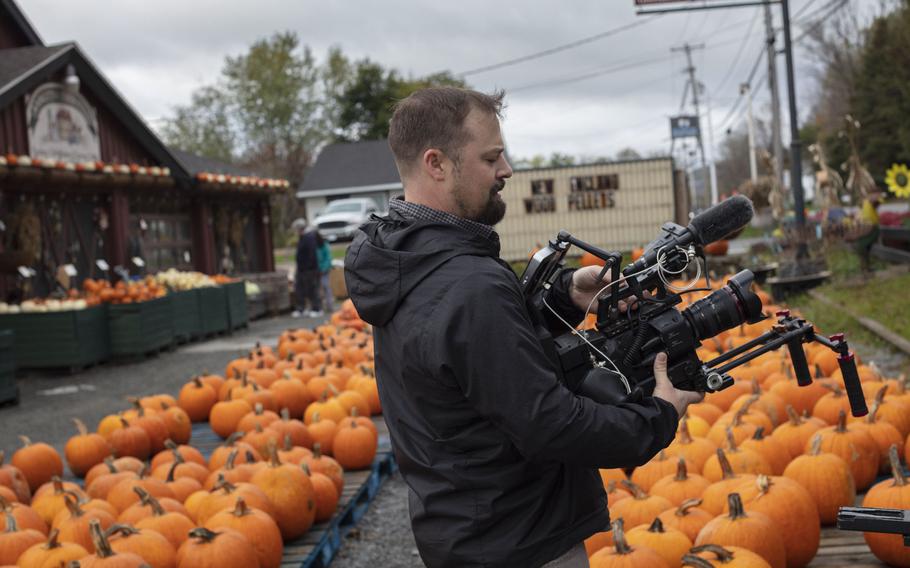
Korey Rowe shoots video for a local business ad in Oneonta, N.Y., on October 19, 2021. (Nadia Sablin/For The Washington Post)
Korey was incredulous. He felt no kinship with the conservative fundamentalists.
Yet he decided to engage, he said, because he believed in accountability. And if people were going to tell the story of "Loose Change," he wanted a chance to influence it. Dylan, on the other hand, tired of being asked about the series, had made it clear he had no interest in talking to the media.
Korey pointed out that 9/11 skepticism at its earliest stages had a lot of support from antiwar liberals like his father, a lifelong Democratic voter who abhorred Trump like Korey himself did. The provenance of these videos was disillusionment, not right-wing politics, he said.
Back then, Korey told them, he had just been trying to make sense of a world that suddenly made no sense at all. He and his friends were young guys with cameras and laptops, he said. They had no formal training in journalism or scholarly research or documentaries. And they had no clout, he added, just an idea that spoke to people.
A lot of people, it turned out.
"Where does distrust in America come from? Look at what America has done. I'm not talking about the conspiracies. We were attacked. And what did we do? We destabilized a country. We invaded another country. We killed hundreds of thousands of innocent people," he said, lamenting that he had fought in those wars.
In retrospect, Korey and his friends had become characters in a story arc they didn't recognize, at once patients and superspreaders of a new disease of viral misinformation that would come to infect all of America.
But how could he and his friends be blamed for creating anger and distrust, Korey tried to understand, when they had been reacting to those feelings themselves?
Could there be some truth to it?
— — —
Before viral internet success, before the attention stopped being thrilling, before he fell into addiction and obscurity, and before therapy and love pulled him out of it all, he was just Korey from Oneonta in upstate New York.
Korey could trace the early plot points of his life while driving through his hometown streets here in Otsego County, on the northernmost tip of Appalachia. It was a region where the landscape often teetered from bucolic to battered and back again.
There was the parking lot at the high school where he was caught buying marijuana for the first time. That incident led him to drop out at 16 years old, which eventually led him to enlist.
There was the county jail, where he was taken on drug charges after becoming addicted to opioids.
There was the one-bedroom apartment where he thought about killing himself during one of his extreme bouts of depression, which he later discovered was tied to undiagnosed bipolar disorder.
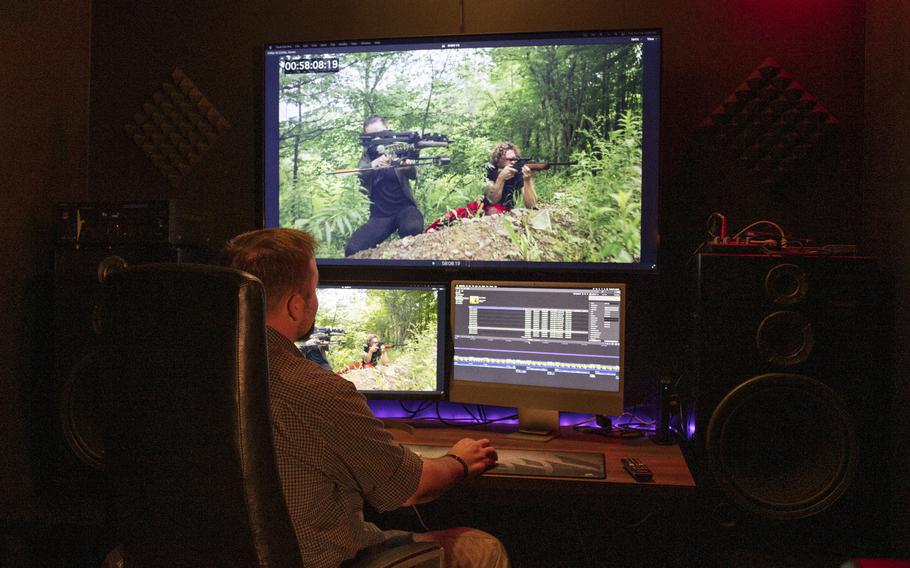
Korey Rowe edits a film his company shot over the summer of 2021 at the Otsego Media office in Oneonta, N.Y., on October 19, 2021. (Nadia Sablin/For The Washington Post)
Korey had moved out of his parents' house when he was 16 and bad decisions were piling up. Two years later, he reckoned that joining the military would at least allow him to save for college. He chose the infantry, he said, because it offered the biggest signing bonus.
The 9/11 terrorist attacks happened just as Korey was beginning basic training. In January 2002, he was sent to Afghanistan for six months, according to military records, then he served for nearly a year in Iraq starting in 2003.
War "was something I wasn't ready for emotionally, physically, mentally," he said. "It was not something I wanted. It was not something I expected. Those were the hardest years of my life."
Looking back, Korey could see a fairly straight line between his wartime trauma, the distrust it elicited and the 9/11 Truth conspiracy theories he embraced. He also recalled in particular how "Fahrenheit 9/11," the 2004 antiwar documentary by Michael Moore, shifted his thinking about the conflicts and his own role in them.
"That's what led me to 'Loose Change,'" he added. "People are surprised when they talk to me now and I'm not a crazy conspiracy theorist. But I'm not. I wasn't into conspiracy theories before 'Loose Change' and I'm not into conspiracy theories now."
The story Korey and his friends told through the videos — twisted with inaccuracy and fantasy as they were — felt like an act of reclamation. Helping Dylan brought a sense of control in a world that felt increasingly uncertain, not to mention a deep sense of camaraderie, Korey said. Slowly, from that crucible of conspiracy theories, he also began to aspire to make movies. Something good from something bad.
"It was like living in some kind of dream world where we weren't really sure what was happening," Korey said. "There was a combination of fear and exhilaration. And as it got bigger and bigger, the fear and the exhilaration just grew. It created a huge wave of new emotions we had never felt."
Korey and Dylan used the viral success to start a short-lived production firm, Korey said, with their significant earnings from "Loose Change" going toward business expenses like office space and staff, as high as $40,000 some months. They garnered enthusiastic support from people like Alex Jones, who would soon become one of America's most famous promoters of conspiracy theories, and who Korey said at one point contributed $100,000 to their effort. Jones was listed as an executive producer on a third, reworked version called "Loose Change: Final Cut," and one of Korey's colleagues from the film later went to work with Jones directly.
As the 9/11 Truth movement grew and evolved, Korey became more aware of the people with outlandish ideas who were gravitating toward their specific project, including some with hard-to-follow conspiracy theories about moon beams and lizard people. He began to feel a deep loathing for those particularly fringe types, he said, in part because he thought they were undermining what he and Dylan believed was a legitimate enterprise. There were so many of them, and in unexpected places — rich, poor, young, old, indulging their fantasies out of public view even while living otherwise mainstream lives.
Conspiracy theories, Korey had seen firsthand, were not just for extremists or kooks. American conspiracism is as old as America itself, scholars say, but the internet was making fringe delusions suddenly more visible than ever while facilitating the growth of new communities of devout believers offline.
"Some of these people are just visceral and angry and hateful and largely base their views on information that is easily discountable. For me, I don't find any kinship in that," he said.
Korey was just learning something that would soon consume American politics and culture as technology made it easier than ever to mobilize grievance, anger and loneliness: Stories have the power to bring order to our lives. They have the power to make us feel seen, less uncertain, more in control. And what are conspiracy theories if not, fundamentally, types of stories?
Stories can heal.
But they can also destroy.
— — —
In a way, Korey believed, his involvement in "Loose Change" had helped keep his symptoms of post-traumatic stress disorder at bay. But by the end of 2007, the production firm he and Dylan started had become financially unsustainable.
It was during that period, Korey said, that he experienced episodes of losing control of his emotions and war flashbacks.
"I think, we were all reaching for a sense of identity. And then it was clearly over. And it was like, what do we do from here?" he said. "The problem is that when you're in your 15 minutes of fame, you don't know it. We were never financially successful from 'Loose Change.' We were never able to buy houses or anything. The most we were able to buy from it were used cars."
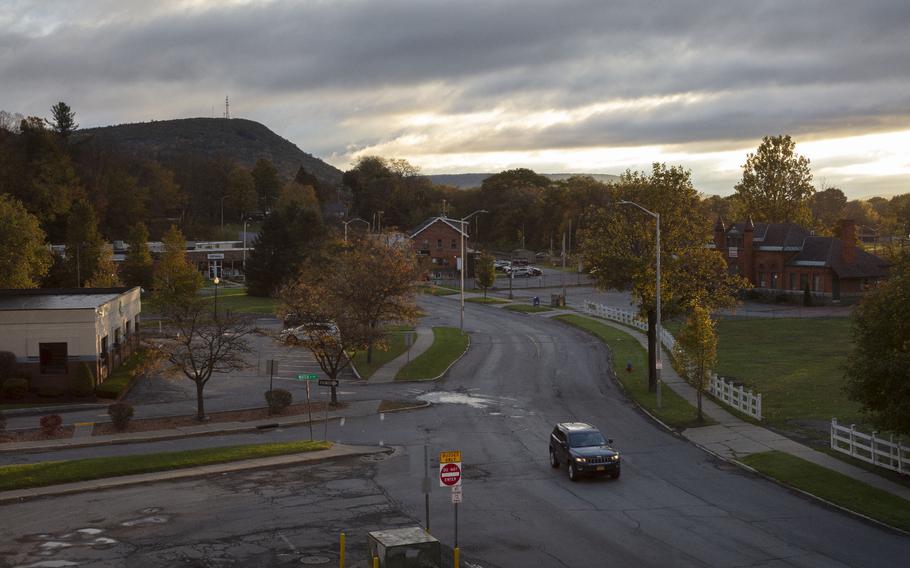
View of Market St. near Korey Rowe’s business in Oneonta, New York on October 19, 2021. (Nadia Sablin/For The Washington Post)
Eventually his growing opioid dependence landed him in county jail, he said, where he spent eight months. Asked if he regretted it, he said no, because it had led him to get his act together. If he was always trying to find something good in tough situations, it was often because he knew he was accountable for creating them to begin with. He joked that he was "always in the wrong place at the right time."
Going to jail "really was an important moment in my life," he said. "When I walked out that door, I was a different person than I was when I walked in."
Korey soon found other missions. He moved to Los Angeles. He started therapy, he said, facilitated by the Department of Veterans Affairs.
And he resolved to tell the story of fellow soldiers who had developed post-traumatic stress disorder and addiction issues after their service. He utilized the skills he had learned while studying video production at SUNY Oneonta, with help from his G.I. benefits.
The result, a 2018 documentary titled "Mile Marker," was styled as a road narrative and featured expansive, vulnerable interviews with several of Korey's fellow service members. It was a triumph for an aspiring storyteller.
Not that it got much attention.
"People don't actually give a s--- about veterans," Korey said.
He recalled how, when he returned to Oneonta from Los Angeles in 2019, he started getting approached by people who believed children were being trafficked and harvested for glands and hormones. These once-fringe beliefs had spread across the internet and became central to the QAnon mass delusion, a radical "big-tent" ideology closely tied to right-wing extremism that had something to offer anyone already inclined to conspiratorial thinking. But increasingly the moral panic over pedophile rings and human trafficking was taking up more and more space in mainstream conservative politics.
Now Korey expressed particular ire for those who intentionally tapped into grievance and conspiratorial fantasy for personal gain, in particular former president Donald Trump.
"People get involved in these movements because it gives them something to do. And largely we've gotten to a point in our society where people feel more estranged than ever," he said.
But hadn't "Loose Change" tapped into that alienation and turned it into clicks? A "remastered" high-definition version of "Loose Change" made in 2016, Korey acknowledged, had brought in a few thousand dollars in much-needed royalty money.
Korey rejected that premise.
"I could not accomplish in my entire life what Donald Trump did in one day for conspiracy theories," Korey said. "He was the president of the United States, had the Oval Office as his megaphone. And he had Fox News, who just broadcasted basically anything that he wanted to say."
He also turned his criticism back at the news media, which he blamed for helping bring credibility to the Bush administration's push to invade Iraq in the first place.
"When reporters ask me, 'Do you feel bad for pushing information that has been proven false?' I ask them back, 'Do you feel bad for working for an organization that passed on information that was proven false?'" he said.
Anyway, Korey wanted nothing to do with it.
He wanted to move on.
— — —
The red Cape Cod-style home where Korey now lived, on the outskirts of Oneonta, was all pink giraffes and plush purple owls. Fall decor had exploded throughout the house even before the leaves had started to turn outside.
"There are times in my life that Oneonta has been the worst place for me, almost physically hard to deal with, but when I was in Afghanistan and Iraq, I started thinking about the trees and the mountains and I understood that Oneonta was one of the most beautiful places on Earth," said Korey.
In the living room, his daughter Paityn, 4 months old, was on her stomach trying to roll over.
His other daughter, Piper, 3 1/2 years old, meanwhile, was running around demanding to play hide-and-seek, saying things like, "Back off, girlfriend!"
Danielle, his wife, was busy making one of Korey's favorites, chicken and biscuits.
For all the projects Korey had undertaken over the years, starting a family was the one he believed had truly saved his life. Everything else now, he said, was in service of getting that right.
"This is my little spot in the world," Korey said.
The rural house was not even wired with an internet connection. To get online, Korey had to use a mobile hotspot.
There were so many reasons to feel unmoored in America, he said, so many existential problems beyond anyone's control. Climate change and the coronavirus pandemic and attacks on the voting rights of racial minorities. Korey raged about the civil immunity recently granted by a bankruptcy judge to the family that owned Purdue Pharma, whose product, OxyContin, was central to the opioid epidemic. Too many of his friends had died of opioid overdoses to count, he said. The only reason he didn't die, he thought, was because of jail and Danielle.
Shadowy plots weren't necessary to explain what was wrong in the world, he said. It happened out in the open.
"I don't think we live in a democracy anymore. I think we live in a predatory capitalist society," he said. "There doesn't have to be a conspiracy theory. The system is corrupt. They do it in broad daylight."
As Danielle was finishing up dinner, Korey spotted Piper turning the doorknob to go outside without permission.
A look of panic swept across his face.
"What are you doing? You know you're not supposed to unlock doors by yourself," he scolded. "We've talked about that, on numerous occasions, right?"
"Sorry," Piper said, pouting.
"Want me to tell you a story why?" he asked.
Piper nodded.
"So imagine what would happen if you went outside in the middle of the winter, unlocked the door, went outside and couldn't get back in and it was the middle of the night. And then Mommy and Daddy didn't know you were outside. That could be really bad," he said.
"Sorry," Piper said again, tears in her eyes now.
"That's OK, give me a hug," Korey told her, his voice suddenly softer.
This little house and the studio were what he had control over.
Now it was time to sit down and eat as a family.
Now it was time to give the girls a bath.
Now it was time to put Piper to bed.
But first he would read her another story. A happy one.
— — —
The studio was coming together.
Projected on the new 58-inch television in the recently painted editing hub was the first cut of an ad that Korey was hired to create for a local gym. Korey had just mounted the screen so clients could see their stories come to life in high definition. Dylan was part of the team, too.
Their approach was very methodical, Korey explained. First they talked to the clients to pin down exactly what they wanted. Then they researched other videos for ideas and aesthetics. Finally, they deliberated on the most compelling stories to tell.
A man trying to turn his life around who lost 100 pounds.
A cancer survivor committed to staying healthy.
A young girl mastering the perfect dead lift.
What was more American than taking a story, tidying it and giving it a glossy finish? Real people transmuted into relatable characters and kneaded into a cohesive narrative.
"I'm excited to show him that on Thursday," Korey said to Alysa, his first full-time employee, satisfied with the outcome. He was helping her with a post-pandemic career change.
This was leaps and bounds more sophisticated than "Loose Change" had ever been, and yet there were echoes of its style there, clear lessons carried over across formats, from conspiracy theories to commercials.
"Loose Change" wouldn't go viral today, Korey mused, because it was too long. People these days preferred short, quick hits of information and story. Who had time to sit through a long narrative, to parse its meaning, to entertain complexity?
"I'm very blockbuster in my editing style," he remarked. "I tend to go over the top to hit people over the head with music and sound editing because that's what captures people's attention."
Orange and black extension cords ran across beaten-up wood floors toward sturdy hand-me-down desks. They were littered with tools and bottles of Coca-Cola. Stacked next to the computers were books with titles like, "The Screenwriter's Bible" and "Management." Korey and Dylan had a feature-length fiction film premiering soon, set in Oneonta, about a family man's struggle to accept that an asteroid is going to hit his house.
It was late September and the interview requests about 9/11 and "Loose Change" had mostly stopped. But Korey was still thinking about the questions they raised. He could not shake his disbelief at the suggestion that he and his friends had done something wrong.
He occasionally betrayed ambivalence about whether to distance himself from "Loose Change" or to embrace it. He did admit that there were some significant mistakes in the information the videos peddled. Nonetheless, he appeared proud of the vast reach it had, to revere it. A few weeks before, he had even posted "Loose Change" on his business's official Vimeo account.
Could he be proud of the reach, proud of the skillfulness, even while distancing himself from the content?
He seemed to believe so.
"We've been blamed for being the godfathers of all conspiracy information on the internet, which is ludicrous. I know from the creator's perspective that it was just trying to ask questions about facts that did not make sense," he said. "And I do want to state, we were 21- and 22-year-old kids. We were far from perfect. But we found ourselves in that situation and we tried to do the best we could do with it."
Korey settled on a thought now: "Loose Change" revealed something in the culture, he said, but it did not cause it.
"It was the underlying message that you're being lied to, and that you've been being lied to for a long time, and that people are benefiting from telling you lies, that's what made 'Loose Change' popular," Korey said.
"Even though there have been problems and Dylan didn't always choose the best information, the genesis of the argument is that there's a system of lies around you and that you need to wake up," he said. "It doesn't matter that it was about September 11. September 11th was the mechanism."
That's the thing about conspiracy theories: They are not rational, but they do have a rationale.
They feed on emotion, like all good stories.
That's what Korey had learned, what he would take with him on to this next venture, lessons from something bad that he would use to create something good. Or so he hoped.
As he left the studio, Korey looked up and smiled at the streaks of yellow and red and orange that had emerged in the trees.
What was more American than starting over?